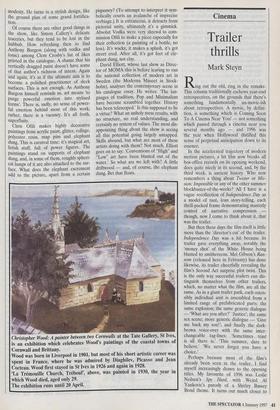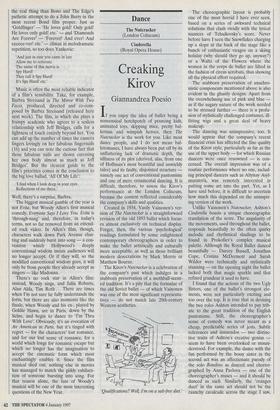Cinema
Trailer thrills
Mark Steyn
Ring out the old, ring in the remake. This column traditionally eschews year-end retrospectives, on the grounds that there's something fundamentally un-movie-ish about retrospectives. A movie, by defini- tion, is something which is Coming Soon To A Cinema Near You! — not something which passed through a cinema near you several months ago — and 1996 was the year when Hollywood distilled this sense of perpetual anticipation down to its essence.
In the accelerated trajectory of modern motion pictures, a hit film now breaks all box-office records on its opening weekend, does quite nicely in its second, and, by the third week, is ancient history. Who now remembers a thing about Twister or Mis- sion: Impossible or any of the other summer blockbuster-of-the-weeks? All I have is a vague recollection of Independence Day as a model of taut, lean story-telling, each thrill-packed frame demonstrating masterly control of narrative compression though, now I come to think about it, that was the trailer.
But then these days the film itself is little more than the 'director's cut' of the trailer. Independence Day was a hit because its trailer gave everything away, notably the `money shot' of the White House being blasted to smithereens. Mel Gibson's Ran- som (released here in February) has done likewise, its trailer cheerfully revealing the film's Second Act surprise plot twist. This is the only way successful trailers can dis- tinguish themselves from other trailers, which, no matter what the film, are all the same. As in a giant trailer park, each osten- sibly individual unit is assembled from a limited range of prefabricated parts: the same explosion; the same generic dialogue — 'What are you after?' Justice'; the same sex scene; more generic dialogue — 'Give me back my son!'; and finally the dark- brown voice-over with the same inter- changeable tag-lines: 'Sometimes trust is all there is.' This summer, dare to believe.' We never forget you have a choice.'
Perhaps because most of the film's already been seen in the trailer, I find myself increasingly drawn to the opening titles. My favourite of 1996 was Leslie Neilsen's Spy Hard, with Weird Al Yankovic's parody of a Shirley Bassey Bond theme. It turns out much closer to the real thing than Bono and The Edge's pathetic attempt to do a John Barry in the most recent Bond film proper. Just as `Goldfinger' — 'He loves gold! Only gold! He loves only gold! etc.' — and 'Diamonds Are Forever' — 'Forever! And ever! And eeeeee-ver! etc.' — climax in melodramatic repetition, so too does Yankovic:
`And just in case you came in late Allow me to reiterate.
The name of this movie is Spy Hard!
They call it Spy Hard!
It's Spy Hard! etc.'
Music is often the most reliable indicator of a film's sensibility. Take, for example, Barbra Streisand in The Mirror With Two Faces, produced, directed and co-com- posed by Barbra Streisand (released here next week). The film, in which she plays a frumpy academic who agrees to a sexless relationship with Jeff Bridges, calls for a lightness of touch entirely beyond her. You can add up the number of times the camera lingers lovingly on her fabulous fingernails (16) and you can note the curious fact that those fabulous nails are shown caressing her own body almost as much as Jeff Bridges'. But the clearest guide to the film's priorities comes in the conclusion to the big love ballad, 'All Of My Life': `I find when I look deep in your eyes Reflections of me there.'
Well, there's a surprise, Barbra.
The biggest musical gamble of the year is not Evita, but Woody Allen's first musical comedy, Everyone Says I Love You. Evita is `through-sung' and, therefore, in today's terms, not so far removed from an extend- ed rock video. In Allen's film, though, characters walk down Park Avenue chat- ting and suddenly burst into song — a con- vention which Hollywood's deeply conventional wisdom insists audiences will no longer accept. Or if they will, so the modified conventional wisdom goes, it will only be from people they already accept as singers — like Madonna.
There's no rock star in Allen's film: instead, Woody sings, and Julia Roberts, Alan Alda, Tim Roth ... There are times when I'm not sure he fully understands the form, but there are also moments like the finale, when Woody and his ex-, played by Goldie Hawn, are in Paris, down by the Seine, and begin to dance to 'I'm Thru With Love'. Obviously, it's an evocation of An American in Paris, but it's tinged with regret — for the characters' lost romance, and for our lost sense of romance, for a world which longs for romantic escape but which no longer has the imagination to accept the cinematic form which most enchantingly enables it. Since the film musical died out, nothing else in movies has managed to match the giddy exhilara- tion of someone bursting into song. For that reason alone, the fate of Woody's musical will be one of the most interesting questions of the New Year.



























































 Previous page
Previous page